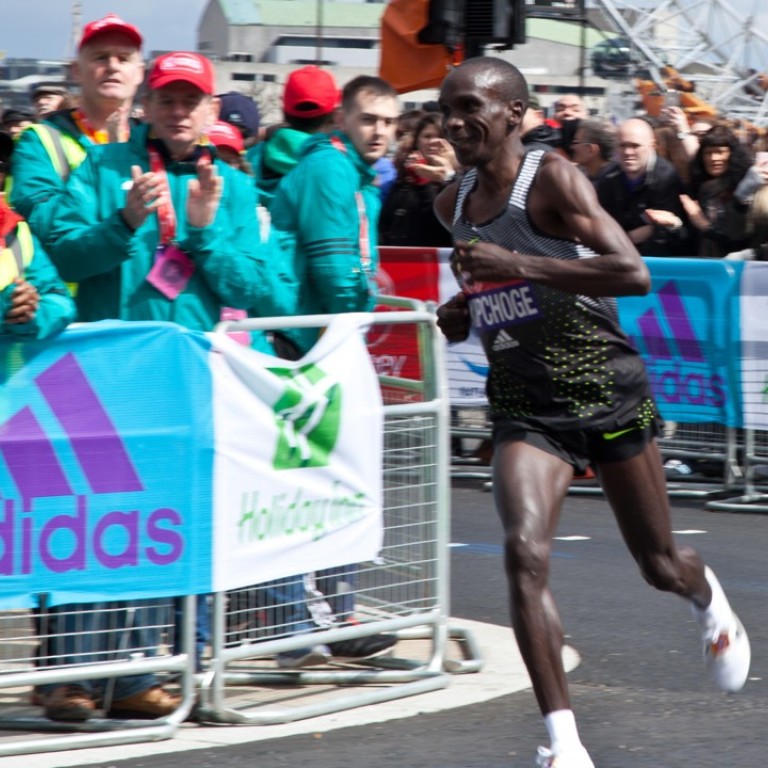
Smiling can improve running: how to make it genuine, such as thinking happy thoughts or listening to something upbeat
Singing, reminiscing about pleasant memories, thinking funny thoughts – all induce happiness which makes activities feel easier and can help performance, research shows. Frowning and grimacing, though, can do the opposite
Whenever she runs, Michelle Yuen makes it a point to recall funny memories and think positive thoughts. This strategy doesn’t just relax her body and mind; it also puts a big smile on her face.
“Smiling keeps the nerves at bay and reduces tension in my body,” says the 43-year-old, who describes herself as a casual runner and trains a couple of times a week with the Hong Kong Ladies Road Runners Club. “This makes for a more pleasant and comfortable run, and when I’m enjoying myself I tend to move a little faster, too.”
102-year-old runner who’s setting records around the globe and the diet of wheatgrass, kefir and pulses that fuels her exploits
A recent study by the Ulster University School of Psychology in Northern Ireland confirmed what Yuen and many top athletes believe: that smiling can decrease an athlete’s perception of effort during endurance exercise. The lower the perceived effort, the easier an activity can feel; as a result, athletes are more likely to perform better. A case in point is Eliud Kipchoge, an Olympic marathon gold medallist and arguably the greatest marathoner in the world, who is often seen grinning broadly during a race.
The small-scale study appeared in the journal Psychology of Sport and Exercise in late 2017. It also found that runners were more economical or efficient – that is, they expended less energy – while smiling. Interestingly, only genuine smiles reaped this positive effect because they helped the runners relax more.

Conversely, the researchers observed that frowning or grimacing increased the runners’ sense of how difficult their run was. Runners who frowned were also less economical.
Dr Cindy Sit is from the Department of Sports Science and Physical Education at the Chinese University of Hong Kong. She says that smiling when running works because it induces happiness, a positive emotion.
“This kind of pleasant emotion could help individuals generate and use energy to sustain their effort and broaden their thought-action urges, which may in turn improve performance,” she says.
“On the other hand, negative emotions, like anxiety, can set you up for a difficult or non-enjoyable run. Negative emotions are mostly associated with poor performance as they may result in decreased effort and energy misuse.”

What if you’re not in the mood to smile during a run? Do it anyway and you might surprise yourself, says Dr Michael Eason, a counsellor and psychologist who practises in Hong Kong’s Central district.
“Smiling is linked to happiness – this idea has a long history in psychology,” he says. “For example, there is a phenomenon called the facial feedback hypothesis. Proposed by American psychologist Silvan Tomkins in 1962, this hypothesis states that by moulding our facial muscles to resemble an emotional state, we can activate that particular emotion. In other words, simply by smiling, we can produce the emotion of happiness.”
This, Eason explains, can occur even if the smile is forced. “By this hypothesis, forcing yourself to smile while running – even if you don’t really feel like it – can trigger the emotion of happiness, and make the overall experience more enjoyable. Although I should add that genuine happiness is more effective than forced happiness.”

All exercise produces endorphins – the “happy hormones” that make us feel good, and the same ones that are also responsible for “runner’s high” – so you may find that you will not have to force or fake anything. However, if you need extra help to increase your happiness, Eason suggests thinking positive or funny thoughts or reminiscing about pleasant memories. Listening to upbeat music or lighthearted podcasts can also create more positive emotions that may trigger a genuine smile and improve your performance.
It’s so important to leave your problems and worries at the door before you race or train
Eason also recommends pairing smiling with “mindful awareness”, which involves focusing on your breath. When negative thoughts arise, acknowledge them without passing any judgment and then return to your breath. This practice can help you endure the temporary but painful physical sensations that often accompany a race or training session.
How yoga, trail running and a vegan diet changed Hongkonger’s life – and cured her underactive thyroid
Frequent runner Lai Yin-mei says that singing while running – either out loud or in her head – never fails to make her smile. The 59-year-old tax consultant adds that smiling stops her from obsessing about her times.
“It’s unrealistic to think that you can maintain a smile for an entire run, but I believe that this expression isn’t just something you wear on your face,” she says.
“It should come from the heart, which is why it’s so important to leave your problems and worries at the door before you race or train. Focus on whatever is happening at that moment, hold only positive thoughts in your mind, and you will be all smiles on the inside.”

